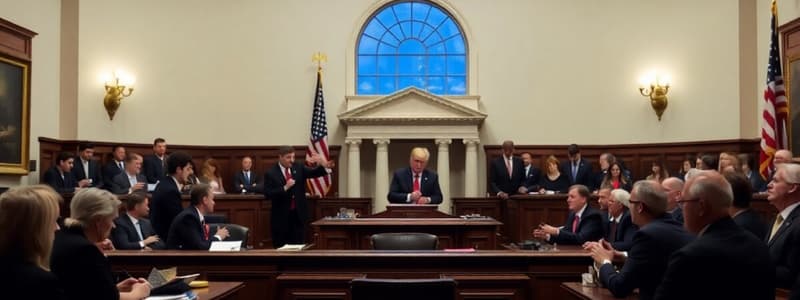Podcast
Questions and Answers
What is required for Congress to override a presidential veto?
What is required for Congress to override a presidential veto?
- Joint resolution signed by the President
- A two-thirds majority in both houses (correct)
- A simple majority in both houses
- A majority vote in the House of Representatives only
Which of the following actions can a President take without needing Congressional support?
Which of the following actions can a President take without needing Congressional support?
- Declaring war
- Appointing Supreme Court justices
- Ratifying treaties
- Issuing executive orders (correct)
What are the two primary steps in the impeachment process?
What are the two primary steps in the impeachment process?
- Charges and final vote
- House approval and Senate trial (correct)
- Proposal and Senate confirmation
- Investigation and indictment
How many votes are required for a President to be convicted and removed from office in the Senate?
How many votes are required for a President to be convicted and removed from office in the Senate?
What major change occurred regarding presidential term limits?
What major change occurred regarding presidential term limits?
What impact did the War Powers Act of 1973 have on presidential authority?
What impact did the War Powers Act of 1973 have on presidential authority?
In which circumstance are Presidents most likely to experience increased approval ratings?
In which circumstance are Presidents most likely to experience increased approval ratings?
Which fundamental view did the founders have regarding the power of the Presidency?
Which fundamental view did the founders have regarding the power of the Presidency?
Flashcards are hidden until you start studying
Study Notes
Lawmaking and "Advice and Consent"
- A veto stops a bill from becoming law.
- Congress can override a veto with a two-thirds majority vote in both the House and the Senate.
- The United States ratifies treaties with other countries when the Senate approves them by a two-thirds majority vote.
- The President can take actions without Congress's support in the form of executive orders or by using their authority as Commander-in-Chief of the Armed Forces.
- The War Powers Act of 1973 limits the President's ability to commit troops to combat without Congressional approval. The President must inform Congress within 48 hours of deploying troops and must withdraw them after 60 days unless Congress approves further action. The act attempted to increase Congressional control over foreign conflicts.
Impeachment
- Impeachment has two steps: the House of Representatives votes to impeach the President, and then the Senate conducts a trial to determine whether to remove the President from office.
- Andrew Johnson, Bill Clinton, and Donald Trump were all impeached.
- No President has been removed from office through impeachment.
- A simple majority vote in the House is needed to impeach, while a two-thirds majority vote in the Senate is needed for conviction.
Responsibilities and Powers
- The Constitution explicitly assigns several responsibilities and powers to the President: These include acting as Commander-in-Chief of the Armed Forces, appointing ambassadors, judges, and other high officials, making treaties, and vetoing legislation.
- Founders envisioned a President with limited terms: The 22nd Amendment limited Presidents to two terms in office. This was added to the constitution in 1951.
- The Founding Fathers did not want a President to be directly elected: They preferred the Electoral College system to ensure representation of all states.
- The founders intended for the President to have a moderate level of power: This included giving him/her the power to veto legislation but also requiring the approval of Congress for many actions.
Managing Congress
- Presidents are more likely to get their way in Congress when their party controls both houses.
- This has changed over time due to political polarization: Congress is more likely to be divided between parties, making it more difficult for Presidents to pass legislation.
Approval Ratings
- Approval ratings are higher during times of national crisis or success.
- Special circumstances such as economic downturns, scandals, or foreign policy successes can increase or decrease a President’s approval rating. For example, President Bush's approval ratings increased after 9/11 but decreased during the Iraq War.
Studying That Suits You
Use AI to generate personalized quizzes and flashcards to suit your learning preferences.




